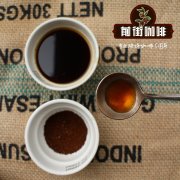Kenya AA Chiambu washing flavor characteristics Kenyan coffee processing plant

Professional coffee knowledge exchange more coffee bean information please follow the coffee workshop (Wechat official account cafe_style)
Qianjie Coffee introduces Qianbu washing in AA, Kenya
High-quality Kenyan coffee beans generally have wonderful fruit flavors, such as common dark fruit flavors such as blueberries, cherries and blackcurrants, or a little sweet and sour grapefruit, with a touch of citric acid and full fruit aromas. Much of Kenya's high-quality coffee comes from its small farmers & cooperatives. Most of these cooperatives are located on hillsides or volcanic slopes above 5,000 to 6,000 feet, and each small farmer has a capacity of only 20 to 70 bags per season. They gather hundreds or 1,000 households to set up cooperative farms, and the government pays for the construction of washing and treatment plants. The coffee fruits picked by small farmers are sent to cooperative farms for unified processing. The whole process is supervised by the official Coffee Administration, and is very rigorous, ensuring the quality of Kenyan coffee. Kenya's high-quality coffee, in addition to the source information of hard-working small farmers, the main double washing method. In Kenya, high-quality coffee beans are fermented by water washing, but it is different from the normal water washing method. In general, after peeling, the pectin layer is fermented only once, and the pectin layer is removed in one step. Coffee processing plants in Kenya ferment twice for the first 12-24 hours, removing 80% of the pectin layer of Mel 90. After washing the coffee beans after the initial fermentation, the second fermentation will be carried out for 24-48 hours to decompose the remaining pectin layer. And two fermentation can avoid excessive fermentation to produce stench, while improving the flavor and taste, creating a Kenyan imprint of the flavor.
Important Notice :
前街咖啡 FrontStreet Coffee has moved to new addredd:
FrontStreet Coffee Address: 315,Donghua East Road,GuangZhou
Tel:020 38364473
- Prev

Kenya guama Moyasani washing Coffee Flavor characteristics Guama processing Plant
Professional coffee knowledge exchange more coffee bean information please follow the coffee workshop (Wechat official account cafe_style) Qianjie Coffee introduction Kenya guama Moya Suni washed coffee country: Guama washing station production area: Kirinyaga: sl28,sl34 treatment: washing grade: AATOP flavor: raisins, berries, sweet apricots, cream Guama processing plant began
- Next

How about red cherry coffee at the processing station in Santa Vini, Ethiopia? Santavini, Ethiopia
Professional coffee knowledge exchange more coffee bean information please follow the coffee workshop (Wechat official account cafe_style) Qianjie coffee Ethiopia Santa Vini processing station red cherry washing origin. SIDAMO ZONE,SNNP,ETHIOPIA processing plant. Santa Vini treatment station variety: local native species treatment.: washing this batch of water washing Hidamo is from Santa Vini.
Related
- Detailed explanation of Jadeite planting Land in Panamanian Jadeite Manor introduction to the grading system of Jadeite competitive bidding, Red bid, Green bid and Rose Summer
- Story of Coffee planting in Brenka region of Costa Rica Stonehenge Manor anaerobic heavy honey treatment of flavor mouth
- What's on the barrel of Blue Mountain Coffee beans?
- Can American coffee also pull flowers? How to use hot American style to pull out a good-looking pattern?
- Can you make a cold extract with coffee beans? What is the right proportion for cold-extracted coffee formula?
- Indonesian PWN Gold Mandrine Coffee Origin Features Flavor How to Chong? Mandolin coffee is American.
- A brief introduction to the flavor characteristics of Brazilian yellow bourbon coffee beans
- What is the effect of different water quality on the flavor of cold-extracted coffee? What kind of water is best for brewing coffee?
- Why do you think of Rose Summer whenever you mention Panamanian coffee?
- Introduction to the characteristics of authentic blue mountain coffee bean producing areas? What is the CIB Coffee Authority in Jamaica?

